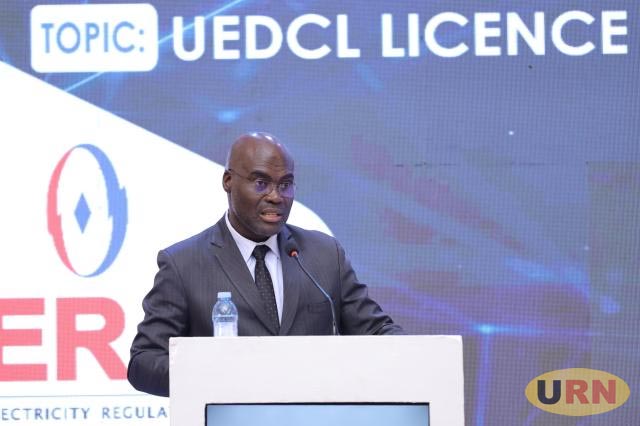
UEDCL promised that there would be no service interruptions even on the day of the takeover, adding that only a notification on how to check for and make a token top-up will be sent to all customers that night.
Kampala, Uganda | THE INDEPENDENT | Uganda Electricity Distribution Company Ltd (UEDCL) has promised a seamless transition when the Umeme Ltd’s power distribution consensus runs out next March.
In 2022, the government decided the 20-year concession would not be renewed for various reasons including underperforming in electricity distribution, the costly payments to the concessionaires and the need to generally rid public services of private operators where necessary.
State-owned UEDCL is one of the companies that have applied to take over from Umeme, and this license application is under scrutiny by the regulator, the Electricity Regulatory Authority (ERA) and other relevant government agencies.
Speaking at a public hearing on UEDCL’s intention to take over, the company’s Managing Director Paul Mwesigwa, said that they are not taking back the assets that have been operated by Umeme, but are also prepared for a 100 percent absorption of the current Umeme staff of 2,502.
“The business is expanding, we need to make more installations on top of taking back those held by Umeme, because they are ours, and we shall therefore have to take all the employees at Umeme,” said Mwesigwa, adding that even more vacancies will be created.
Promises by the company, in case they are granted the concession, included connecting all consumers, including private and government agencies, on the prepaid metering system, commonly known as Yaka.
This caused discomfort among some corporate consumers, with tower company, ATC asking for exceptions as it will be “tedious to migrate”, yet they have been consistently compliant with payments.
However, UEDCL said migration to smart metering was a global move and that they would help any one finding problems, adding that in the areas where they currently distribute power including police and army barracks and health facilities.
Mwesigwa promised that there would be no service interruptions even on the day of the takeover, adding that only a notification on how to check for and make a token top-up will be sent to all customers that night.
“We don’t want the customer to observe or have a feeling that on the midnight of 31st of March there was a change. Everything should remain smooth for the better of the country,” he said.
According to the transition plan that ERA and UEDCL have been discussing with Umeme, Umeme will continue with normal operations until the last day, including receiving and processing electricity connections for new customers.
As part of their strategy, UEDCL plans to connect at least 300,000 customers annually, increase their office network from the current 65 to 100 countrywide, including some of those occupied by Umeme, as well as lower the national average energy losses from the current 16.4 to 15.2 percent by 2027.
They also promise to reduce to 45 the number of days taken before paying transmission companies (in this case, Uganda Electricity Transmission Company Ltd) so as to enable them pay the generation companies to ensure a stable ecosystem.
To achieve all this, however, UEDCL will present a financing plan of 4 trillion Shillings for the next three years, which will partly be used to buy out Umeme and to make new investments.
The Chief Finance Officer, Jacqueline Kiwanuka, said that part of this money will come from a planned 435 million-dollar (1.6 trillion Shillings) loan, with a 6 percent annual interest and a 10-year repayment period.
The Umeme buyout is planned at 225 million dollars (827 billion shillings) while 210 million (772 billion Shillings) will help fund new investments over the next three years.
Most respondents were concerned about the stability or standard of the services when UEDCL takes over, questioning the capacity to step in Umeme’s shoes.
Ziria Tibalwa Waako, the ERA Executive Director assured them that the company had built capacity, on top of having the government at its owner.
Eng Waako also dismissed fears that the process to contract a new concessionaire was in violation of the government programme for the rationalisation of ministries, departments and agencies.
“The decision and subsequent process were informed by the amendment to the Electricity Act in 2022, which was part of the implementation of the rationalisation policy of government. So, what we are doing does not contravene, but rather supports the rationalisation policy,” she said.
Under the Cabinet Memorandum on Rationalization of Agencies and Public Expenditure (RAPEX), all electricity companies are planned to be merged into one entity.
Waako added that it was also part of the Second Generation Reforms in the Electricity Supply Industry which directed that all concessions with private sector companies, including that of Umeme, should not be renewed.
But the reforms also provides for the direct purchase of power from the national grid by a specified category of consumers.
In reiterating the capacity of UEDCL, ERA Board Chairperson, Sarah Wesagali Kanaabi, said the company had been running distribution businesses where Umeme and other distributors could not reach, and that recently it had taken on the concessions that were previously in the distribution industry.
These include Pader-Abim Community Multipurpose Electricity Cooperative Society (PACMES), which was supplying Pader, Abim, Lamwo, Kotido and other districts in parts of the north.
The others are Kyegegwa Rural Electricity Cooperative Society supplying Kyegegwa, Manyi and Nakasongola among others, as well as Kilembe Investments Ltd supplying Rubirizi, Kasese and Bushenyi districts.
“And I want to say, UEDCL has successfully done this very well and will bring this experience to the wider concession,” she said, in a tone suggesting that UEDCL is poised to win the concession.
The concession for the management of electricity distribution in areas currently supplied by Umeme was advertised in sections of the public media in October last year.
The impending exit of Umeme also got shareholders in the company worried about their investments. 39.2 percent of Umeme shares (listed on the Uganda Securities Exchange) are held by Ugandans, and another 7 percent by East Africans. Africans hold 23.6 percent, while the rest, 30.1 percent are held by international investors.
Tibalwa said Umeme will continue being on the market and when time comes, the shareholders will be settled according to the buyout plan.
“Umeme is a body Corporate and will survive the end of the concession. Shareholders must be longing to get dividends from the buyout amount (more than 800 billion Shillings) among others. The shareholders should continue their relationship with the company, which is governed by the Capital Markets Authority),” she said.
As at the end of the year 2023, Umeme’s made revenues totaling 2.2 trillion Shillings and a net profit of 11.5 billion, while its total assets amounted to to 2.35 trillion.
***
URN
 The Independent Uganda: You get the Truth we Pay the Price
The Independent Uganda: You get the Truth we Pay the Price



